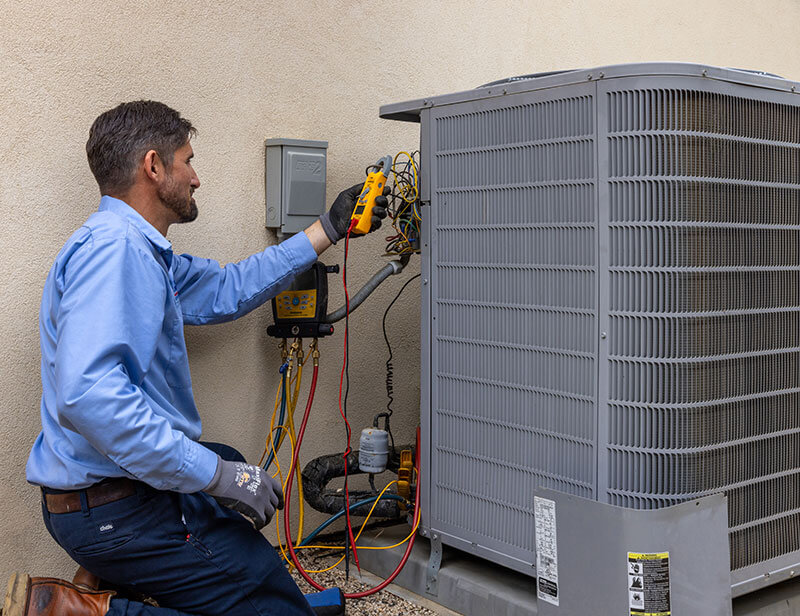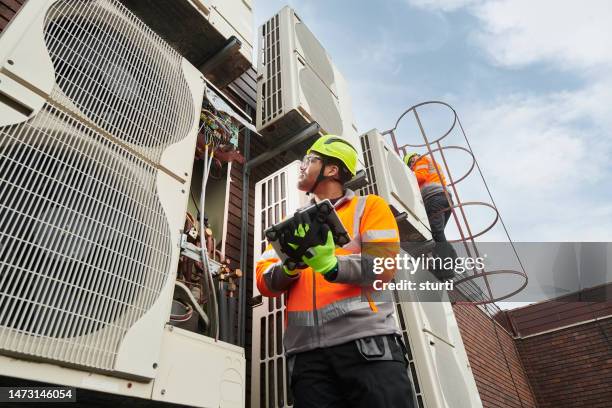Advice from Technicians on heat pump installation ooltewah tn
Wiki Article
Choosing In Between a Heatpump and Furnace: Secret Considerations for Your Cooling And Heating Demands
When assessing heating options for HVAC needs, the choice between a heatpump and a heater can be intricate. Each system supplies unique benefits tailored to certain climates and energy efficiency goals. Understanding these differences is crucial for making an enlightened selection. Trick variables such as installment expenses and environmental impact further complicate the option procedure. Which alternative genuinely straightens with one's comfort and sustainability preferences? The following areas will certainly explore these considerations in information.Recognizing Warm Pumps: Exactly How They Work and Their Advantages
While lots of house owners think about different heating alternatives, recognizing exactly how heatpump function and their benefits can considerably influence their choice. Heat pumps operate by transferring heat as opposed to producing it. In the wintertime, they draw out warmth from the outdoors air or ground and move it inside, while in the summertime, they reverse this procedure, cooling the home by expelling warmth outside. This dual capability makes them versatile for year-round environment control.One of the primary advantages of heatpump is their power efficiency. They utilize considerably much less electricity contrasted to traditional home heating systems, possibly leading to reduced utility expenses (ductless mini splits). In addition, heatpump have a smaller sized carbon impact, making them an ecologically pleasant choice. They likewise call for less maintenance than traditional systems, adding to long-lasting price financial savings. On the whole, understanding the technicians and benefits of heat pumps can aid property owners make notified choices concerning their heating and cooling needsChecking Out Heaters: Kinds, Procedure, and Benefits
Furnaces come in various types, including gas, electric, and oil designs, each with unique functional systems. Comprehending these distinctions is important, as they affect effectiveness and heating performance. Additionally, furnaces provide many advantages, such as constant warm outcome and dependability in chillier climates.Sorts of Furnaces
Heating systems can differ substantially in layout and operation, with heaters being a popular choice amongst homeowners. There are numerous kinds of heating systems, each using different gas resources and modern technologies. Gas heaters prevail, leveraging gas to produce warmth successfully. Electric heaters, on the various other hand, make use of electrical resistance to produce heat, often preferred for their simple setup. Oil heaters, while much less common, are effective in locations with restricted gas access (heat pump service). Additionally, condensing heaters make the most of energy performance by capturing and recycling exhaust gases. Each kind operates through a system of warm exchangers and ductwork to distribute cozy air throughout a home. Recognizing the distinctions between these furnace kinds is essential for notified heating and cooling choicesBenefits of Heaters
For property owners looking for reputable heat during chilly months, the benefits of furnaces are substantial. Furnaces give consistent home heating, guaranteeing also temperatures throughout the home. They are specifically efficient in severe cold, often outmatching heatpump in freezing problems. Various kinds, including gas, electric, and oil heaters, offer versatility to fulfill diverse requirements and preferences.Furnaces additionally have a tendency to have reduced initial setup prices compared to heat pumps, making them a much more available choice for several. Their durable layout adds to a longer life-span, with several devices lasting over 15 years with proper maintenance. Additionally, contemporary heating systems are typically outfitted with advanced innovation for boosted performance, which can bring about lowered power costs. On the whole, heaters continue to be a dependable choice for effective home heating.
Power Performance: Comparing Heat Pumps and Furnaces
When comparing energy effectiveness in between heatpump and heaters, the Seasonal Energy Performance Ratio (SEER) plays a crucial function in identifying efficiency. In addition, an operational expense evaluation discloses the long-lasting monetary ramifications of each system. Comprehending these elements can direct property owners in making notified decisions about their home heating remedies.Seasonal Energy Efficiency Ratio
Energy efficiency plays a necessary duty in the decision-making procedure in between heatpump and furnaces, especially when considering the Seasonal Power Efficiency Ratio (SEER) This metric actions the cooling effectiveness of heatpump over an entire cooling season, providing a standard method to examine performance. Greater SEER ratings show better power performance, converting to reduced power intake and decreased energy expenses. In contrast, furnaces are generally assessed utilizing the Annual Gas Usage Performance (AFUE) score, which mirrors heating effectiveness. When contrasting these two systems, homeowners should focus on SEER rankings for heat pumps, as they straight influence overall power financial savings and environmental sustainability. A thorough understanding of SEER can significantly affect the long-term fulfillment and cost-effectiveness of the picked heating and cooling remedy.Functional Cost Analysis
Recognizing the operational prices associated with warmth pumps and furnaces is essential for house owners examining their options. Heat pumps typically use higher power effectiveness, converting electric energy right into warmth with minimal waste. This leads to reduced month-to-month energy costs, specifically in modest environments. Alternatively, typical furnaces, particularly gas models, may have reduced ahead of time prices yet can sustain greater operational expenses in time because of fuel prices and effectiveness ratings.Moreover, heatpump can work as both heating and cooling systems, possibly decreasing the need for separate heating and cooling units. While initial financial investments for heatpump might be higher, their long-term financial savings in power effectiveness can make them a more cost-effective selection for lots of families. Cautious analysis of neighborhood power rates is vital to establish the most effective choice.Installation Expenses: What to Expect for each and every Home Heating System
Installation prices for heating systems can vary significantly between warmth pumps and heating systems, affecting house owners' decisions. Heatpump typically have greater in advance installment expenses, typically varying from $3,500 to $8,000, depending on the system dimension and complexity of setup. This includes the outside device, indoor handling system, and necessary ductwork adjustments. Conversely, heating systems tend to have lower first costs, averaging in between $2,500 and $6,000, which can be appealing for budget-conscious homeowners. Installation costs can raise if comprehensive ductwork is required.Moreover, the option of gas kind for heaters-- natural gas, propane, or electric-- can also affect setup prices. While heatpump supply energy efficiency, their initial investment might discourage some purchasers. Inevitably, evaluating installation costs alongside long-term savings and efficiency will assist property owners in making informed decisions about their heater.Climate Factors To Consider: Which System Executes Much Better in Your Location
Exactly how do climate conditions influence the effectiveness of heater? The efficiency of warm pumps and heating systems can vary greatly depending upon the regional climate. In modest environments, warmth pumps stand out by effectively transferring warmth from the outdoors air, making them an energy-saving choice. Their effectiveness decreases in extremely cool temperatures, where they may have a hard time to extract enough warm. On the other hand, heat pump replacement ooltewah tn furnaces, specifically gas models, give consistent and dependable warmth despite exterior conditions, making them more effective in colder regions.In areas that experience milder winters, warm pumps can run efficiently year-round, giving both heating and air conditioning. On the other hand, regions with severe wintertimes usually gain from the effectiveness of heating systems. Inevitably, understanding the regional environment is important when determining between a warm pump and a heating system, as it straight affects their operational effectiveness and total efficiency.Maintenance Requirements: Long-Term Treatment for Warm Pumps vs. Furnaces
While both heatpump and heating systems require normal upkeep to guarantee peak performance, their details requirements and care regimens vary significantly. Furnaces generally need much less constant focus, with yearly examinations being sufficient to inspect for gas leaks, clean filters, and evaluate overall functionality. Their simpler style frequently permits uncomplicated repairs.In comparison, heatpump demand biannual upkeep because of their dual duty in heating and air conditioning. This includes cleansing coils, inspecting refrigerant degrees, and guaranteeing that both the outside and indoor devices work at their ideal. Furthermore, heat pump maintenance frequently entails even more detailed elements, making professional maintenance essential.Neglecting maintenance can bring about diminished effectiveness and enhanced power costs for both systems. Eventually, homeowners need to take into consideration these long-lasting treatment demands when picking between a heat pump and a heater, as positive maintenance can extend the life expectancy and performance of either system significantly.Environmental Influence: Selecting a Sustainable Home Heating Alternative
The environmental effect of heater is an important read more analysis for homeowners seeking sustainable options. Heat pumps are typically more energy-efficient than standard heaters, as they move warmth as opposed to create it, greatly reducing carbon emissions. By utilizing renewable energy sources, such as air-source or geothermal heatpump, home owners can further lessen their ecological footprint.On the various other hand, all-natural gas heating systems release greenhouse gases and contribute to air pollution, though they frequently offer higher warmth result. Nevertheless, improvements in modern technology have actually resulted in the development of high-efficiency heaters that decrease emissions.Ultimately, picking a heating system involves considering effectiveness against ecological impact. Property owners are urged to assess local energy resources and rewards for eco-friendly systems, making sure a choice that lines up with both individual comfort and ecological responsibility. The choice impacts not just immediate convenience but likewise long-term sustainability and environmental wellness.Often Asked Inquiries
For How Long Do Warmth Pumps and Furnaces Usually Last?
The life-span of heatpump typically ranges from 15 to two decades, while furnaces can last between 15 to three decades. Regular maintenance significantly affects their durability and performance in giving heating services.Can I Make Use Of a Heatpump in Incredibly Cold Climates?
Warm pumps can run in exceptionally cold climates, but their effectiveness reduces as temperature levels decline. In such problems, supplemental heating resources might be necessary to maintain comfy interior temperature levels and assure peak efficiency.
What Is the Sound Degree of Heat Pumps Versus Furnaces?
The noise levels of heatpump and heaters vary significantly. Usually, heatpump operate more quietly than typical heating systems, making them more effective for those delicate to seem, while furnaces may create louder functional sounds throughout home heating cycles.
Are Warmth Pumps Suitable for Both Cooling And Heating?
Heatpump are without a doubt appropriate for both heating & cooling (heat pump service). They work by transferring warm, supplying reliable temperature level control year-round, making them a functional selection for homeowners seeking an all-in-one heating and cooling optionWhat Dimension Heating Unit Do I Required for My Home?
Establishing the appropriate size heater for a home calls for evaluating elements such as square footage, insulation high quality, regional climate, and the home's format. Consulting a specialist can ensure a precise assessment and perfect comfort. Warmth pumps generally offer higher power effectiveness, converting electric power right into warmth with minimal waste. In modest environments, warmth pumps succeed by successfully transferring heat from the outdoors air, making them an energy-saving choice. Alternatively, heaters, specifically gas versions, supply constant and reputable heat no matter of outside problems, making them more suitable in cooler regions.In areas that experience milder wintertimes, warmth pumps can operate properly year-round, offering both home heating and air conditioning. Heat pumps are normally more energy-efficient than standard heaters, as they transfer warm instead than create it, significantly minimizing carbon exhausts. By utilizing sustainable power resources, such as geothermal or air-source warm pumps, house owners can better reduce their environmental footprint.On the various other hand, all-natural gas furnaces release greenhouse gases and add to air contamination, though they frequently supply greater warmth company website result.Report this wiki page